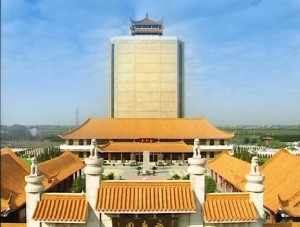In Shanghai, luxury funerals mean big profits


SHANGHAI -- Squint a little, and the grey concrete tower with a red pagoda roof slapped on top looks like any of a thousand other new office buildings in Shanghai. But a clearer view reveals that in place of glass, the building’s windowspaces have been covered with concrete, concealing urns holding the funeral ashes of over ten thousand people.
The 12 storey "Cultural Memorial Building," contains over 30 rooms where locals pay their respects to deceased relatives. Funeral urns are kept in the building’s concrete walls, and families buy small cabinets which line the rooms like gym lockers, where they place photos of the deceased, and offerings including designer watches, eyeglasses, plastic fruit, and miniature sports cars.
Some rooms are outfitted in mahogany, with plush leather sofas plucked straight out of an upmarket Shanghai coffee house. In others, the cabinets have been replaced by screens which replay video and photos of the deceased.
Leaving offerings for the dead is commonplace in China, where obligations to look after family members continue long after their death. Those obligations loom largest during April’s Tomb Sweeping Festival, when Chinese people symbolically clean their ancestor’s earthly resting place, leaving food and setting fire to paper money, which tradition claims can be put to use in the afterlife.
During the 1960s upheaval known as the Cultural Revolution, groups of young people smashed gravestones in protest at China’s funeral traditions, which they identified with social hierarchy and superstition. But Tomb Sweeping festival has made a comeback in recent years, and China:s government made it a national holiday in 2008. The revival has coincided with the longest period of rapid economic growth in recent Chinese history, with predictable results: more lavish funerals, and luxury graves.
Shangai’s Fushouyuan targets the high end of China’s funeral market, and to call it a cemetery would be something of an injustice. Over thirty thousand people are buried here, but Fushouyuan also counts a movie theatre, restaurants and a museum amongst its attractions. Newlywed couples make pilgrimages here to take wedding photos, posing next to manicured lawns and artificial rivers just a stones throw away from the 12 storey funeral Cultural Memorial building.
High-end customers want customized headstones, music and somewhere to get a meal after the funeral. “People used to be content with a simple funeral, but now they want more of an experience to remember,” Tang You, Fushouyuan’s head of marketing said.
Graves here don’t come cheap: a top plot can set locals back the equivalent of 120,000 USD. That’s allowed Fushouyuan to expand, adding a hotel for visiting mourners, and a museum which celebrates Fushouyuan’s celebrity residents. A two hundred seat cinema shows revues of works by Shanghai film directors buried nearby.
On a drizzly March afternoon, Fushouyuan’s general manager Wang Jisheng sits with a group of shareholders in the graveyard’s restaurant. Dishes of sea cucumber, roast duck and pork dumplings revolve languidly on a gigantic lazy susan. “I never expected to work in the funeral industry,” said Wang, a former economics professor, part of a generation of that abandoned academia for business as the Chinese economy took off in the early 1990s. “I saw the potential for development,” he said.
That potential has attracted attention from foreign investors too. Representatives from The Carlyle Group, the worlds largest venture capital firm, were whizzed around Fushouyuan in white golf-carts, imported from California, during a vist last year. But no concrete investments have emerged from the visit, Wang said.
Government restrictions on land-purchases are a squeeze on the industry. “Getting land is always the biggest problem,” Wang said. Chinese laws restrict the maximum size of a grave plot to two square meters, so Fushouyuan’s headstones remain modestly sized.
In China, people often talk about economic development in somewhat mystical tones, and it can be hard to separate the idealistic impulse to improve society from the desire to make a quick profit. But Wang is convinced that graveyards like Fushouyuan are changing China for the better. “As a teenager, I saw red Guards in Shanghai destroying graves,” he said. “How we treat the dead is a mark of our level of civilization.”
Pictures: Fushouyuan
This post was originally published on Smartplanet.com